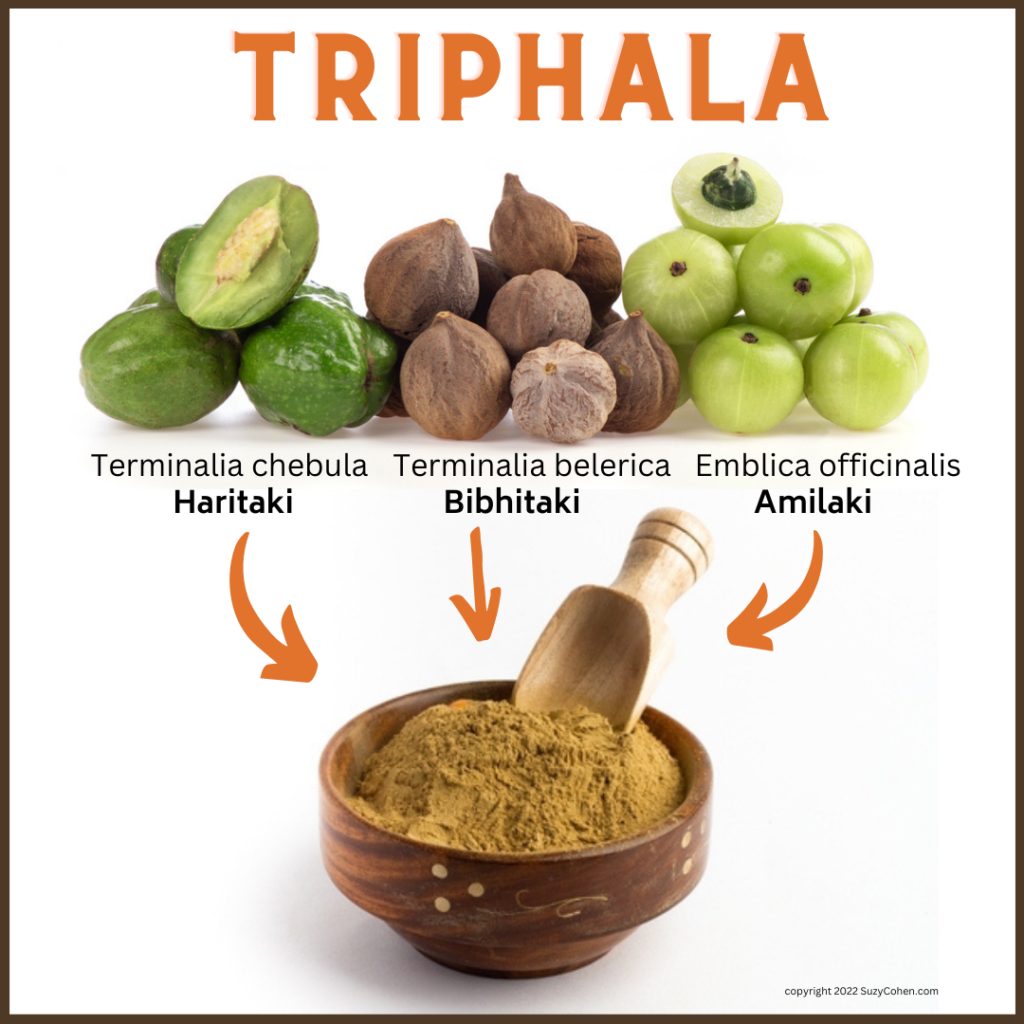What's On This Page?
ToggleMost experts today agree on one thing and that is that good health begins in the gut. And since herbal remedies represent the most ancient medicines of our healthcare history, I would like to focus today on one particular supplement that is foundational.
It’s called Triphala. “Tri” refers to the number three, and “phala” means fruits.
Triphala is a combination of three fruits: Haritaki, Amalaki, and Bibhitaki.
If you become interested in this supplement, it is sold nationwide at health food stores, and online. I do not sell this but I think it could be of value for some of you who are uncomfortable in your gut. Triphala comes as a powder or a capsule supplement, and you can also find it as tea and in specialty cleanse supplements. I don’t like the word “cleanse” though, it conjures up images of sitting on the toilet for a long time and “detoxying” and that is NOT at all what Triphala does!
Many people experience gastrointestinal (GI) problems, and even long-term inflammatory bowel diseases such as Ulcerative Colitis (UC), Crohn’s disease, or Irritable Bowel Syndrome (IBS). Some people have bloating, flatulence or other GI problems. No matter the cause of these problems, Triphala, a unique botanical formula, has a long history of therapeutic value! It will significantly reduce colonic inflammation and may support other treatments for those of you with inflammatory abdominal pain and problems.
Before I get to the potential uses of Triphala, it’s important to note that reducing GI symptoms requires dietary changes, a good deal of time, and different methods! It is not like you take a pill (for example an acid blocker) and you’re good. That’s one thing that I think some people forget when they leave the doctor’s office with a prescription for omeprazole.
Relieving GI symptoms, especially in people with serious conditions, may require changing your diet, or some dietary supplements, or even probiotics, prebiotics, herbal medicines, acupuncture, and exercise.
Extensive research has been conducted on Triphala, so that is the focus of today’s article. It is a complementary treatment that I think can help reduce inflammation through the intestinal tract, improve gut permeability and improve transit time. It has extensive and undeniable benefits in other arenas because it is chemoprotective and immunomodulatory.
In other words, it appears to have uses for cancer and is used by practitioners who employ Ayurvedic medicine. Here in America, you do not hear of that because supplements are not permitted to treat diseases, or cancer or any such things. In the USA, only pharmacologic agents are used therapeutically for diseases, not herbal extracts. But that regulation aside, I think it is worth sharing with you what the scientific studies are in case you want to research some more on your own, or converse with your doctor here in the USA about using this widely available, over-the-counter herbal treatment for your individual case.

When studying herbal treatments and cancer, one has to be very careful about discerning study outcomes and conclusions. I researched this topic for quite some time and even visited the Memorial Sloan Kettering Cancer Center and here’s a direct statement from their website regarding some potential uses. I have cut/pasted their broad-based uses here for you, and further down I have listed 14 potential uses that I see for Triphala:
- To treat GI problems
Animal models suggest gastroprotective effects, but human studies are lacking.
- To control inflammation
Animal studies suggest that Triphala may reduce inflammation, but human studies are lacking.
- To decrease high levels of cholesterol
Clinical studies are limited and mixed. Additional studies are needed.
- To strengthen the immune system
Data are limited and larger studies are needed.
- To prevent gingivitis
Several clinical studies suggest that Triphala may help reduce dental plaque, but it is not clear if it as effective as chlorhexidine mouthwash.
- To treat cancer
Although anticancer properties of Triphala have been observed in the lab, human data are lacking.
Be sure to limit sugary drinks, as studies have shown that cancer grows faster with those. You can read my article about it HERE.
14 Potential Uses for Triphala
1. Restore gut microbiome
2. Manage constipation and hemorrhoids (by relieving constipation)
3. Some cases of diarrhea depending on cause
4. Reduce bloating
5. Help gastritis
6. Antiviral action against a wide variety of organisms including Hepatitis B and 8. Indigestion and belching
7. Liver congestion
8. Gallbladder concerns
9. GI fungal infections (mild)
10. Flatulence
11. SIBO (Small Intestinal Bowel Overgrowth, either hydrogen dominant or methane)
12. IBS – Irritable Bowel Syndrome symptomatic relief
13. Crohn’s and/or Colitis – disease symptomatic relief
14. Allergic rhinitis
2 Additional uses that I can think of:
- Infections of H. pylori. I just want to clarify this one and I didn’t list it above because there are no solid studies, but there is potential for help. As for H. pylori infections, there is not a strong “kill” action against this organism, medications are employed for the antibiotic purpose. However, Helicobacter pylori is a major cause of inflammation in the stomach, and Triphala quells inflammation in the gut, so it could help.
- 6. Offset NSAID-induced GI inflammation and irritation. Again, this isn’t well-studied but I think Triphala might be able to help offset some of the harm that occurs to the gastric lining if you have to take NSAIDs a lot. I’d say it’s definitely better than doing nothing!
There are many more therapeutic uses that you can study if you read this paper entitled, Therapeutic Uses of Triphala in Ayurvedic Medicine.
Triphala is traditionally used in Ayurvedic medicine but practitioners of all kinds, from all over the world recognize its value today. The “tri” in the name Triphala refers to three different fruit-derived constituents in the blend:
1. Indian gooseberry (Emblica officinalis)
2. Black myrobalan (Terminalia chebula)
3. Belleric myrobalan (Terminalia bellirica)
Dried herbal extracts of the above 3 fruits are what constitute Triphala so when you buy a bottle of Triphala supplement, you are getting all 3 of those herbs. (I don’t sell this at my vitamin shop, however, it’s available at health food stores nationwide, online retailers, and most holistic-oriented clinics like at your acupuncturist’s clinic or naturopath’s office.)
Triphala has a very soothing anti-inflammatory effect on the entire gut, and can bring some degree of relief to a small percentage of people within a few days! The reason is that it provides strong anti-inflammatory and immunomodulating benefits. It can support healthy gut microflora and even offer antimicrobial and antioxidant protection. That’s what you need if your GI tract is inflamed or infected. Each of the 3 constituents (fruits) of Triphala has its own special gut-healing benefits, although they are not mutually exclusive.
These actions are what you need if you have an upset stomach, diarrhea or constipation. If you’d like to learn about more remedies for constipation, read my article entitled “7 Impressive Natural Remedies For Chronic Constipation” HERE. These actions are what you need if you have a mild GI infection too!

Triphala and Cancer Outcomes
The following studies are available online so that you and your oncologist can review the results together. Do not self-treat cancer.
Pancreatic Cancer Study
The conclusion: Our preclinical studies demonstrate that Triphala is effective in inhibiting the growth of human pancreatic cancer cells in both cellular and in vivo model. Our data also suggests that the growth inhibitory effects of Triphala is mediated by the activation of ERK and p53 and shows potential for the treatment and/or prevention of human pancreatic cancer.
Gastric (Stomach) Cancer Study
Comparison of Gastroprotective Effects of Triphala Formulations on Stress-induced Ulcer in Rats
The conclusion: Triphala is a promising antineoplastic agent for the treatment of gastric carcinomas with significant antiproliferative and antimetastatic activities.

Breast and Prostate Cancer Study
Oxidative Stress and Cancer: Chemopreventive and Therapeutic Role of Triphala
The study’s conclusion: Triphala has shown anticancer activities in various cancer cell lines. Using a cytotoxic assay, it was found that the aqueous extract of Triphala decreased the proliferation of breast and prostate cancer cells.
Colon and Colorectal Cancer Study
The researchers’ conclusion: Triphala inhibited human colon cancer stem cells colony formation, a measure of cancer stem cells self-renewal ability. Anticancer effects of triphala observed in our study warrant future studies to determine its efficacy in vivo.
The conclusion: Chebulinic acid is not only a critical component of the anticancer activities of triphala but also a promising natural multi-target antitumour agent with therapeutic potential.
Cautions
When it comes to GI health, make sure you have a complete workup to rule out anything serious, do not delay seeking medical attention by trying herbs. And like all other herbs, there are cautions and warnings.
- Do NOT use or take Triphala if you are pregnant. At least one of the components in this herbal remedy is associated with miscarriage.
- Triphala may reduce blood pressure so do not combine the supplement with antihypertensives and be aware that blood pressure may be impacted and hypotension may be amplified.
- Allergies are possible with all herbs and medications.
- It may interact with a medication you take, and lead to higher blood levels and side effects. More specifically, Triphala impairs cytochrome P450 enzymes which can lead to a build-up of the drug (if your drug also goes through that pathway).
For example, warfarin, some antidepressants and antipsychotics, a few anti-seizure medications, and cholesterol-reducing statins often involve the cytochrome P450 enzymes. Please ask your local pharmacist if you have a specific question about whether or not your medication interacts with Triphala (or goes through the P450 pathway). - Triphala may cause digestive upset in some people. It is ironic, but it’s possible and something to note when you start taking the supplement.
- Do NOT use or take Triphala if you have a serious emergency type of medical problem, for example, pancreatitis, abdominal abscess, intestinal blockages, blood in the stool, appendicitis, ascites, jaundice, or some other crisis not mentioned here. The herb is not useful for emergency concerns.
- Ask your physician or holistic practitioner if this type of formula is right for your needs. I am not a doctor and cannot advise.
In Closing
Historically speaking, herbal remedies are considered among the most powerful methods of supporting good health. Triphala is multi-tasking and can support many aspects of gastrointestinal health, but again, not emergencies.
I rarely recommend an all-in-one product for people because it usually depends on the specific problem, but with Triphala, I feel different. If you have pretty much any mild tummy or GI problem, you should consider it. Probiotics are another supplement that I sometimes suggest as a ‘wet blanket’ for chronic GI problems.
If you’re interested in Triphala, I suggest you do a quick Google search for reputable studies and scientific papers that are referenced and learn as much as you can. You can see if it sounds right for you, and follow up with your gastroenterologist if you would like to add the herbal remedy for a situation you’re dealing with. It is good, but it isn’t a panacea for all digestive concerns!
Of course, it’s best to get your practitioner’s knowledge and consent. It is also wise to get your lab work and images/scans and stool tests back!
People often ask if you should stop taking Triphala periodically, and then restart again. Sometimes you have to do that with other herbal GI antimicrobials. But with Triphala, practitioners often say it is safe to take daily if desired without stopping it. This is up to you. People with SIBO sometimes take it daily (ie chronically) because it helps to keep the small intestine clear of pathogenic bacteria.
I do not sell Triphala at my VITAMIN SHOP, but many outstanding brands are available at health food stores nationwide and online retailers. There isn’t a dosage that I can broadly recommend.
The suggested use is noted on the product label, and you should follow that unless your practitioner suggests some other dose for you.
Triphala is usually okay to take without regard to meals. It has a very mild diuretic effect, meaning it helps to reduce some water weight (and bloating). This mild effect is sometimes imperceptible, however, you may want to take it in the morning or afternoon if you notice this effect.
If you have an experience with Triphala, positive or negative, feel free to send me a brief story at this EMAIL so I can post a few comments here – your feedback will benefit others.

Suzy Cohen, has been a licensed pharmacist for over 30 years and believes the best approach to chronic illness is a combination of natural medicine and conventional. She founded her own dietary supplement company specializing in custom-formulas, some of which have patents. With a special focus on functional medicine, thyroid health and drug nutrient depletion, Suzy is the author of several related books including Thyroid Healthy, Drug Muggers, Diabetes Without Drugs, and a nationally syndicated column.


